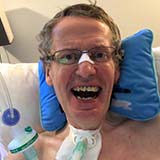John Hughes offers a patient’s perspective on how medical professionals can help
I was fifty nine years old when diagnosed with Motor Neurone Disease in 2014. After being given the diagnosis I joked to the obviously uncomfortable neurologist “if there’s only one stiff drink to be had here I think you’d better have it.“ MND is portrayed in the UK as an unbearable fate. But, I swear I have lived a joyful life these past five years.
First came bulbar symptoms; mainly difficulties swallowing and breathing. So I had a feeding tube inserted into my stomach, and used a ventilator and mask to assist breathing. As my speech deteriorated, I used a gaze controlled computer. After two years the mask was insufficient and it grew harder to clear my lungs of aspirated mucus. Realising I was dying, I disregarded the neurologists’ advice and my fears, and in 2016 underwent a tracheostomy.
I’m almost completely paralysed now, at home in a hospital bed. I can’t eat or drink, so I’m fed liquidised food through the tube into my stomach: but I do have a few delightful spoonfuls of expresso coffee on my tongue. Through the tube each evening goes a glass of Bordeaux, and before sleep Chartreuse. With my gaze controlled computer I’m writing this article, I use email and WhatsApp, Facebook, do complex spreadsheets, watch cricket, write letters, play chess, listen to music and watch films. I’m never bored. I help run a small charitable trust.
I don’t suffer much pain, just annoying inconveniences. Sleep sometimes doesn’t come easily, but I listen to talking books. My carer turns me every few hours. No two days are ever the same. Years ago I suffered from depression but don’t anymore. I’m happy, and this has been a surprise to me. From my description of life with the disease I expect you think happiness is inconceivable in such a condition (I would have thought the same before). I don’t regret my decision to opt for life, it’s wonderful!
Of the five neurologists I’ve met during my illness all but one when confronted with me were gloomy and disheartening. I was consistently discouraged from considering tracheostomy. I was pitied. I received little advice on the likely course of the disease and the options to consider, all clearly pessimistic about the prospects for anything except unhappiness and death for one in my condition.
I was advised that life expectancy following tracheostomy would be only months, that my ‘quality of life’ would be poor, that it would cost a fortune, and that it would be impossibly challenging for my carers. This hasn’t been my experience and I found no evidence for these predictions in any large scale research. According to research, the rate of tracheostomy for MND patients in the UK is zero, whereas in Japan it is 27-45%. [1] (Although the low rate in the UK may be to some degree influenced by some hospitals discouraging the procedure, it is interesting to note that the UK MND Association is undertaking a review of their hitherto negative stance on tracheostomy.) A twenty year research study in Japan revealed a mean survival period of 74 months from diagnosis for tracheostomised patients; however, those with a spouse, living at home and under 65 years old at the time of tracheostomy survive for much longer. [2] It seems improbable that if life with MND was so unbearable that so many in Japan would be choosing to prolong their lives.
I have three conclusions. Neurologists helping MND patients need training in how to interface with the patient, break the news, and advise on likely progress of the disease and the available options; research supports this conclusion. [3] Other research demonstrates the happiness of even the most severely impaired patients afflicted with neurological illnesses, and that medical professionals underestimate this. [4,5] Thirdly, neurologists, especially in the UK, should review their stance on tracheostomy especially in light of the above mentioned Japanese experience.
 John Hughes is a retired businessman and psychotherapist
John Hughes is a retired businessman and psychotherapist
Competing interests: None declared
References:
1] Morten Magelssen, Trygve Holmøy, Morten Andreas Horn, Ove Arne Fondenæs, Knut Dybwik, Reidun Førde. 2018. Ethical challenges in tracheostomy-assisted ventilation in amyotrophic lateral sclerosis. Journal of Neurology
2] Muneyoshi Tagami, Fumiharu Kimura , Hideto Nakajima, Shimon Ishida, Shinya Fujiwara, Yoshimitsu Doi,Takafumi Hosokawa, Kazushi Yamane, Kiichi Unoda, Takahiko Hirose, Hiroki Tani, Shin Ota, Takumi Ito, Masakazu Sugino, Keiichi Shinoda, Toshiaki Hanafusa. 2014. Tracheostomy and invasive ventilation in Japanese ALS patients: Decision-making and survival analysis: 1990–2010. Journal of the Neurological Sciences 344 (2014) 158–164
3] Brizzi, MD, C. J. Creutzfeldt, MD. 2018. Neuropalliative Care: A Practical Guide for the Neurologist. Seminars in Neurology 2018;38:569–575.
4] D. Lule, C. Zickler, S. Hacker, M.A. Bruno, A. Demertzi, F. Pellas, S. Laureys and A. Kubler. 2009. Life can be worth living in locked-in syndrome. Progress in Brain Research, Vol. 177 Chapter 23.
5] Dorothée Lulé, Benedikt Ehlich, Dirk Lang, Sonja Sorg, Johanna Heimrath, Andrea Kübler, Niels Birbaumer & Albert C. Ludolph. 2013. Quality of life in fatal disease: the flawed judgement of the social environment. Journal of Neurology (2013) 260:2836–2843
